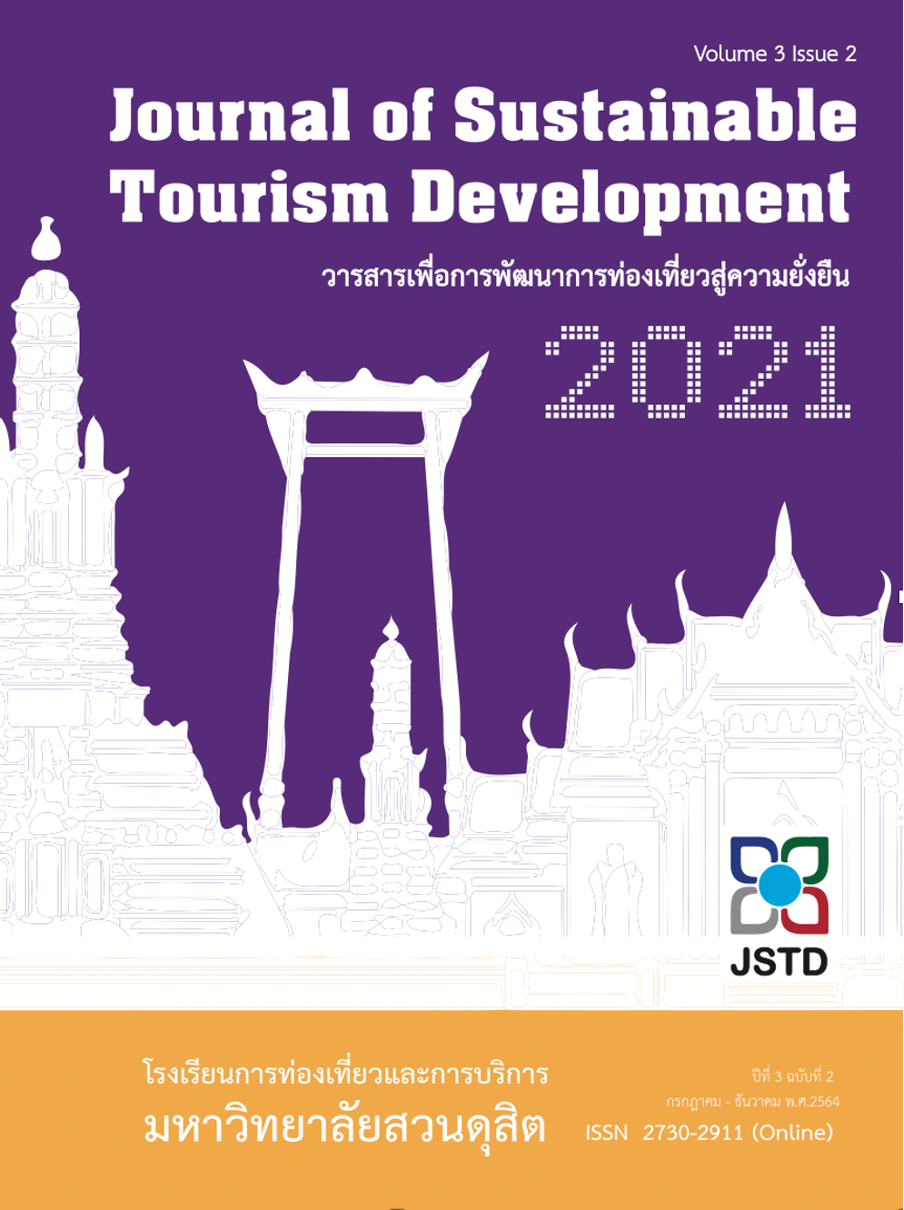Development of Chinese Language Learning Activities of Hotel Business Students through Game-Based Learning to Enhance Chinese Communication, Emotional and Social Skills
Main Article Content
Abstract
The purposes of this research were 1) to develop activities for teaching Chinese in the classroom through games to enhance the students' Mandarin Chinese language skills, emotional and social skills 2) to compare the learning achievement of Mandarin Chinese language skills and emotional and social skills between the pre and post semester periods 3) to study the students' satisfaction with the activities of teaching the Mandarin Chinese language. The research population consisted of 67 students in the Hotel Business of Suan Dusit University who enrolled in Chinese for Interpretation Course. The research instruments were a test of Chinese language skills, an assessment of emotional and social skills, an activity plan for teaching Mandarin Chinese in classrooms through games and a satisfaction survey questionnaire. The statistics used in this study were percentage, mean, standard deviation and pair samples t-test. The results found that the students' learning achievement in Mandarin Chinese language skills, the emotional and social skills after teaching through games was significantly higher than in the pre-study period at the .01 level. The students' overall satisfaction was at a high level with 4.42 mean score. The most satisfying aspect was Chinese language teaching activities in classrooms through games, especially in the topic that helping students to have a better attitude in learning Chinese showed mean score at 4.81 The results also proved that activities for teaching Mandarin Chinese in the classroom through game was an effective tool in developing the four Chinese language skills along with the emotional and social skills.
Article Details

This work is licensed under a Creative Commons Attribution-NonCommercial-NoDerivatives 4.0 International License.
ลิขสิทธิ์ต้นฉบับที่ได้รับการตีพิมพ์ในวารสารเพื่อการพัฒนาการท่องเที่ยวสู่ความยั่งยืน ถือเป็นกรรมสิทธิ์ของโรงเรียนการท่องเที่ยวและการบริการ มหาวิทยาลัยสวนดุสิต ห้ามผู้ใดนำข้อความทั้งหมดหรือบางส่วนไปพิมพ์ซ้ำ เว้นแต่จะได้รับอนุญาตอย่างเป็นลายลักษณ์อักษรจากโรงเรียนการท่องเที่ยวและการบริการ มหาวิทยาลัยสวนดุสิต นอกจากนี้ เนื้อหาที่ปรากฎในบทความเป็นความรับผิดชอบของผู้เขียน ทั้งนี้ไม่รวมความผิดพลาดอันเกิดจากเทคนิคการพิมพ์
References
กรมวิชาการ. (2546). พระราชบัญญัติการศึกษาแห่งชาติ พ.ศ. 2542 และแก้ไขเพิ่มเติม (ฉบับที่ 2) พ.ศ. 2545 และพระราชบัญญัติการศึกษาภาคบังคับ พ.ศ. 2545. กรุงเทพฯ: อักษรไทย.
กฤษฎาภรณ์ ทิพใส อรนุช ศรีสะอาด และ ปรีชา จันทวี. (2556). การพัฒนาทักษะทางสังคมของนักเรียนระดับปฐมวัย โรงเรียนบ้านตูม (นพค.15กรป. กลางอุปถัมภ์) สํานักงานเขตพื้นที่การศึกษาประถมศึกษาศรีสะเกษ เขต 4 จังหวัดศรีสะเกษ โดยใช้การจัดกิจกรรมเสริมประสบการณ์. วารสารการวัดผลการศึกษา มหาวิทยาลัยมหาสารคาม, 19(2), 1-12.
จรีลักษณ์ รัตนาพันธ์. (2557). ทักษะทางสังคม. สืบค้น 5 กันยายน 2561, จาก http://jareeluk.blogspot.com /2014/09/blog-post_27.html
จื่อเยียน ถัง และ สิทธิพล อาจอินทร์. (2559). การศึกษาความสามารถด้านการฟังและการพูดภาษาจีนของนักเรียนชั้นมัธยมศึกษาปีที่ 5 โดยใช้การจัดการเรียนการสอนแบบทางตรงร่วมกับเทคนิคเกม. วารสารศึกษาศาสตร์, 10 (1), 7-12.
นฤชล สถิรวัฒน์กุล. (2563). การใช้เกมในการสอนภาษาจีน สำหรับนิสิตชั้นปีที่ 3 สาขาวิชาการจัดการธุรกิจการบิน มหาวิทยาลัยรัตนบัณฑิต. วารสารบัณฑิตวิจัย, 11(1), 81-89.
พิมพร วัฒนากมลกุล และมโนรัตน์ สมคะเนย. (2563). การพัฒนาทักษะการเรียนรู้คำศัพท์ภาษาจีนโดยการใช้เกมผ่านแอปพลิเคชัน. วารสารสวนสุนันทาวิชาการและวิจัย, 13(1), 98-109.
ไพศาล สุขใจรุ่งวัฒนา. (2563). ผลของการใช้เกมเพื่อพัฒนาทักษะการสื่อสารภาษาจีน. วารสารเอเชียตะวันออก
ศึกษา, 24(2), 35-48.
ไพรินทร์ ศรีสินทร. (2559). การบูรณาการกิจกรรมในวิชาไวยากรณ์จีน กรณีศึกษาการใช้เกมประกอบการสอน. วารสารนวัตกรรมการเรียนรู้, 2(1), 65-79.
ศศิณัฎฐ์ สรรคบุรานุรักษ์ วนิดา ชูเกียรติวัฒนากุล และเก็จวิรัล ตั้งสิริวัสส. (2559). การประเมินหลักสูตรศึกษาศาสตรบัณฑิตสาขาวิชาการสอนภาษาจีนในฐานะภาษาต่างประเทศ คณะศึกษาศาสตร์ มหาวิทยาลัยศิลปากร. วารสารศึกษาศาสตร์ มหาวิทยาลัยศิลปากร, 14(1), 140-148.
Bandura, A., & National Inst of Mental Health. (1986). Social foundations of thought and action: A social cognitive theory. Prentice-Hall, Inc.
Bar-On, R. (1997). The emotional quotient inventory (EQ-i): A test of emotional intelligence. Toronto: Multi-Health Systems.
Baumeister, R. F., & Bushman, B. J., (2011). Social Psychology and Human Nature. (2nd ed.). Belmont, CA : Wadsworth.
Buckley, K. E., & Anderson, C. A. (2006). A Theoretical Model of the Effects and Consequences of Playi
ng Video Games. In P. Vorderer & J. Bryant (Eds.), Playing video games: Motives, responses, and consequences. (pp. 363–378). Lawrence Erlbaum Associates Publishers.
Cooper, R. K. & Sawaf, A. (1997). Executive EQ intelligence in leadership and organization. New York: Grosset Patnum.
Cingel, D. P., & Krcmar, M. (2017). Prosocial Television, Preschool Children’s Moral Judgments, and Moral Reasoning : The Role of Social Moral Intuitions and Perspective–Taking. Communication Research, 93(1), 112-127.
Erikson, E. (1968). Identity: Youth and crisis. New York: W. W. Norton & Company.
Goleman, D. (2006). Social intelligence: The new science of human relationships. Bantam Books.

